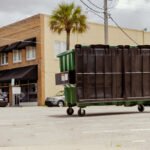Ever thought of dumpster diving to make some extra cash or score free goods? In Florida, this practice walks a fine line between legality and trespassing. With its balmy weather and abundance of retail hotspots, the Sunshine State presents a tempting playground for dumpster divers seeking treasures amid the trash. But before you don your diving gear, it’s crucial to understand the nuances of Florida’s laws on this unconventional pursuit.
Dumpster diving, or the act of sifting through commercial or residential dumpsters for discarded items that may still have value, is a divisive topic. While some view it as a resourceful way to reduce waste and score freebies, others perceive it as a nuisance or even a criminal act. The stance on dumpster diving in Florida is a patchwork of local ordinances and property rights, making it a legal gray area. In some areas, it’s perfectly legal, while in others, it could result in a trespassing charge.
This article will delve into the legalities, best practices, and potential hotspots for dumpster diving in Florida, shedding light on this unique subculture. We’ll explore the opportunities – and risks – it presents for savvy scavengers. We’ll also touch on the ethical considerations and the environmental impact of this practice. Whether you’re looking to furnish your home, find rare collectibles, or simply save on expenses, understanding the local laws and respecting property boundaries is key to successful dumpster diving in Florida.
Is Dumpster Diving Legal in Florida?
Dumpster diving in Florida is legal thanks to a 1988 Supreme Court ruling. The court case in question involved a man named Bruce Edward Clark, who was arrested in 1983 for taking items from a dumpster behind a pharmacy store in Key West. The police charged Clark with theft, but the case made its way up to the Supreme Court, where the justices ruled that trash placed in an exterior garbage receptacle was considered abandoned property and could be legally taken.
This Supreme Court decision set a precedent making dumpster diving legal across the United States, including Florida. As long as the dumpster is accessible from public property and not placed behind a locked fence or gate, dumpster diving itself is not prohibited by law.
However, there are some legal restrictions to be aware of. Although you can legally take items from dumpsters, you cannot trespass on private property to access a dumpster. For example, if a dumpster is inside a fenced area or locked parking lot, you cannot climb the fence or enter the lot to access it without permission. Stores may also ask you to leave if they don’t want you dumpster diving on their premises. While diving itself isn’t illegal, violating trespassing laws to access a dumpster can get you into trouble.
Best Spots for Dumpster Diving in Florida
Some of the best spots for dumpster diving in Florida include grocery stores, retail chains, and college campuses.
Grocery Stores
Grocery stores often have to discard food items that are nearing expiration dates or have damaged packaging. This makes their dumpsters a prime target for finding edible food to salvage. Some of the best grocery store chains to check are Publix, Winn-Dixie, Aldi, Trader Joe’s, and Whole Foods. Be aware of any local ordinances restricting dumpster diving behind grocery stores.
Retail Chains
Popular retail chains like Walmart, Target, Best Buy, and Bed Bath & Beyond routinely throw away returned merchandise or lightly damaged goods. Their dumpsters can contain some real treasures if you get lucky. The best time is often at night after they close for the day. Exercise caution and watch for security personnel.
College Campuses
Especially at the end of spring and fall semesters when students move out, college campuses have a wealth of furnishings, clothes, appliances, and electronics tossed in their dumpsters. Check for campus policies on dumpster diving before attempting. Good targets are large universities like University of Florida, Florida State University, and University of South Florida.
Best Days and Times to Go Dumpster Diving in Florida
The best days and times to go dumpster diving often depend on the specific store or location. However, there are some general tips to follow for when stores are most likely to throw out still-usable items.
For grocery stores, the best days are typically Mondays and Tuesdays. This is when new shipments of perishables arrive, so stores will clear out older produce, meats, baked goods, and dairy products. Going early in the morning around store opening hours is ideal. Stores also tend to throw out expired items on Wednesdays.
For retail chains like department stores and big box stores, the recommended days are Mondays and Fridays. Mondays is when they sort through inventory after the busy weekend. Fridays is when they filter out items to make room for weekend merchandise. Going in the evenings after closing time is best.
College campuses are bountiful on move-out days at the end of semesters when students discard furnishings, clothes, appliances, and more. These occur usually in early May and mid-August. Go during the 1-2 weeks around move-out.
Safety Tips
When going dumpster diving, it’s important to take proper safety precautions. Here are some tips:
- Go in pairs or groups – Never go dumpster diving alone. Having others with you can help spot dangers, assist if injuries occur, and discourage harassment.
- Wear gloves – Wear thick gloves to protect your hands from sharp objects. Consider bringing an extra pair in case the first gets dirty. Leather gloves with rubber gripping can provide flexibility and dexterity.
- Bring a flashlight – Having a flashlight, even during the day, helps you see better in dark dumpsters. Headlamps free up your hands.
- Avoid glass – Be very careful around broken glass which can cause deep cuts. Try not to disturb glass items and containers. Wear closed toe shoes in case you step on shards.
- Watch for needles – Hypodermic needles sometimes end up in dumpsters. Use tools like grabbers to shift items and look carefully before reaching in blindly.
- Keep first aid supplies – Bring bandages, disinfectants, and tweezers in case you get injured. Know where urgent care centers are located.
- Look before climbing in – Quickly scan the area before jumping into a dumpster to avoid landing on something hazardous.
- Be aware of dumpster contents – If you spot chemicals, rotting matter, or anything suspicious, avoid that dumpster. Don’t risk your health.
Taking proper precautions helps make dumpster diving safer and more enjoyable. Always put safety first, and use good judgment. Never take unnecessary risks while diving.
What to Look For
When dumpster diving, you can find a variety of discarded items that are still in good condition. Here’s what to keep an eye out for:
Unexpired Food
Grocery stores often throw out food that has reached its sell-by date but is still perfectly good to eat. This includes packaged items like cereal, crackers, and canned goods. Produce like fruits and veggies may get tossed while still fresh. Bakeries discard breads and pastries daily.
Returned/Slightly Damaged Goods
Retail stores will frequently toss lightly used or damaged merchandise they can’t resell at full price. This includes clothing with minor defects, open box electronics, and more. Items may just need minor repairs.
Discarded Household Items
Apartment buildings and college dorms are great spots to find households items that students left behind. You can often find furniture, small appliances, decor, and more. These can be cleaned up and made usable again.
Legal Repercussions
While dumpster diving itself is legal in Florida, there are some legal repercussions to be aware of. Many cities and towns have local ordinances that restrict or prohibit accessing certain dumpsters, especially those on private property. These ordinances may classify dumpster diving in those locations as trespassing.
It’s important to know your local laws and avoid any dumpsters that are clearly marked “No Trespassing” or “Private Property.” You can often find a copy of local ordinances online or request them from your city or town hall. Ignoring posted signs and local laws could result in fines or even arrest for trespassing.
Additionally, if you are caught dumpster diving by store employees, even if not prohibited by law, they can ban you from returning to that location or all locations of that chain. Most stores don’t press charges unless you’ve been warned before, but will add you to a “banned customer” list. So if you plan to regularly frequent certain stores’ dumpsters, it’s best to avoid getting caught by employees.
The key is being aware of any posted signs, abiding by local laws, and avoiding detection when diving at your favorite spots. As long as you are respectful of stores’ policies and local ordinances, you shouldn’t run into any legal issues dumpster diving in Florida. But knowing the potential repercussions can help you stay safe and out of trouble.
Conclusion
Dumpster diving can be a fun and lucrative way to find perfectly good items that stores and restaurants are throwing away. With some planning and preparation, you can safely and legally go dumpster diving in Florida to supplement your income.
The key is knowing which locations tend to have the best finds on certain days and times. Grocery stores, retail chains, and college campuses are hot spots to try. The best days are often weekends or days when inventory is restocked. Going in the evening yields better results after stores have removed expired or unneeded items.
Always be safe by bringing gloves, flashlights, and going with a friend. Avoid making a mess and only take items you know you’ll use. Be aware of any local ordinances that may restrict accessing certain dumpsters. Overall, have fun exploring this unconventional way to save money and reduce waste! With the right approach, dumpster diving can be an ethical, legal and rewarding experience in Florida.

Hi, I’m Ivy, and I dumpster dive a lot! I’ve been diving for 10 years now & I’ve been able to reduce my carbon footprint so much. I live off what I dive, and I usually donate a couple hundred pounds of food per month to my local food pantry.
Long term, I plan on opening my own food pantry in Florida. This way I will be able to help those in need to get not only the food they need but the healthy fresh food they need, which most food pantries don’t/can’t give away.


